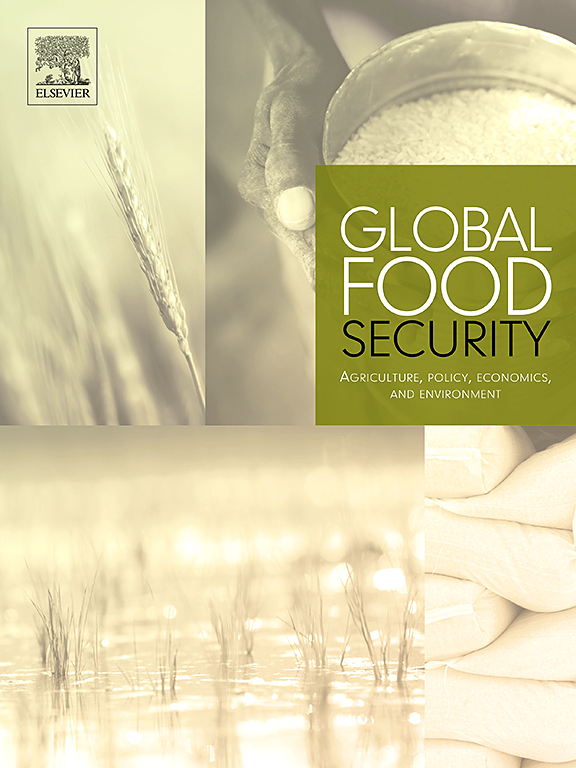The effect of social capital on food insecurity: Insights from a household survey
IF 9.6
1区 经济学
Q1 FOOD SCIENCE & TECHNOLOGY
Global Food Security-Agriculture Policy Economics and Environment
Pub Date : 2025-09-01
DOI:10.1016/j.gfs.2025.100882
引用次数: 0
Abstract
Most previous research on food insecurity treats households in isolation, overlooking social interactions. The purpose of this study is to analyze the causal relation between social capital and food insecurity. We have addressed potential endogeneity issues using access variables as instrumental variables and employed a recursive bivariate probit model to analyze the relation between social capital and food insecurity across three illustrative cases. We utilized a unique dataset comprising 72,056 households, which includes questionnaires on food insecurity and social capital. For the first time, we were able to assess the causal relation between social capital and food insecurity, finding that social capital reduces food insecurity by 23–25 percentage points. Our findings aim to inform and support the expansion of social capital-based food policies as a strategy to mitigate food insecurity. Moreover, we argue that a larger dataset would need to include food insecurity and social capital questionnaires to provide new insights to reduce food insecurity. Finally, we argue that larger datasets should include both food insecurity and social capital modules to generate new insights for reducing food insecurity.
社会资本对粮食不安全的影响:来自家庭调查的见解
以往大多数关于粮食不安全的研究都孤立地对待家庭,忽视了社会互动。本研究的目的是分析社会资本与粮食不安全之间的因果关系。我们利用获取变量作为工具变量解决了潜在的内质性问题,并采用递归双变量probit模型分析了三个说述性案例中社会资本与粮食不安全之间的关系。我们使用了一个包含72056户家庭的独特数据集,其中包括关于粮食不安全和社会资本的问卷调查。我们首次能够评估社会资本与粮食不安全之间的因果关系,发现社会资本将粮食不安全降低了23-25个百分点。我们的研究结果旨在为扩大以社会资本为基础的粮食政策作为缓解粮食不安全的战略提供信息和支持。此外,我们认为需要一个更大的数据集,包括粮食不安全和社会资本问卷,以提供减少粮食不安全的新见解。最后,我们认为更大的数据集应该包括粮食不安全和社会资本模块,以产生减少粮食不安全的新见解。
本文章由计算机程序翻译,如有差异,请以英文原文为准。
求助全文
约1分钟内获得全文
求助全文
来源期刊

Global Food Security-Agriculture Policy Economics and Environment
FOOD SCIENCE & TECHNOLOGY-
CiteScore
20.90
自引率
3.40%
发文量
69
期刊介绍:
Global Food Security plays a vital role in addressing food security challenges from local to global levels. To secure food systems, it emphasizes multifaceted actions considering technological, biophysical, institutional, economic, social, and political factors. The goal is to foster food systems that meet nutritional needs, preserve the environment, support livelihoods, tackle climate change, and diminish inequalities. This journal serves as a platform for researchers, policymakers, and practitioners to access and engage with recent, diverse research and perspectives on achieving sustainable food security globally. It aspires to be an internationally recognized resource presenting cutting-edge insights in an accessible manner to a broad audience.
 求助内容:
求助内容: 应助结果提醒方式:
应助结果提醒方式:


